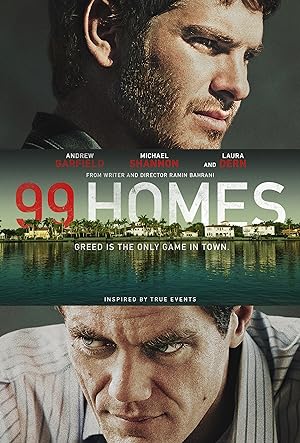I planned to have a Michael Shannon double feature movie outing: 99 Homes and Freeheld, but a physical injury dimmed my enthusiasm. Michael Shannon may often play bad guys, but he always plays them differently. He is an American acting genius, and I have a slight crush on his excellence. I was psyched when the Brattle Theater announced a double feature: Crimson Peak and 99 Homes. What do these movies have in common? They were released in theaters the same year. Who cares? I’m there: center row, center seat. Gimme gimme!
99 Homes is set in Florida and is about Dennis Nash, a single father/construction worker, who struggles to support his hairdresser mother and son, but suffers a terrible blow when the bank forecloses on his home. The face of foreclosure is Rick Carver, played by Shannon, a real estate agent. Nash ends up working with Carver to try and get his home back. 99 Homes is a Faustian tale implicitly set soon after the financial crisis of 2007 through 2008 when banks are too big to fail, but people are too small to save.
99 Homes’ story’s strength is never forgetting to make the audience feel the characters’ pain. The characters feel like real people, particularly during the foreclosure montages, which reminded me of Up in the Air. Up in the Air cast twenty-two people who were actually fired to relate their experiences in the film, but ultimately pulls punches to make the story uplifting. 99 Homes keeps its foot on the gas and feels like a horror movie that never ends except the villain isn’t Shannon though he is the scapegoat. The villain is the marriage of finance and government acting to exploit individuals, and this exploitation would still exist even if Shannon disappeared.
99 Homes suggests that there are two ways to cope. One way is to retain your soul and morals, but remain stuck in poverty and hopelessness. The other way is to just look out for yourself and exploit the system and victims of the system, which is represented by Carver, who is not unscathed by this choice. 99 Homes frames the narrative with Carver’s reaction to extreme emotional and physical responses to his methods.
SPOILERS
99 Homes begins with a suicide and a widow with two children as Carver surveys the carnage. He is appalled but keeps it moving. Why does he decide to mentor Nash? Nash is effective, desperate and financially beneficial, but Carver’s decision is also an act of charity. Carver essentially buys a friend that he can vent to about his background and rationalizes his choice to survive. Carver may be the mentor, but Nash is Carver’s father figure. Carver wants confirmation that he is doing the right thing by getting a disciple, but ultimately Nash chooses his soul over success. When Carver says, “Thank you,” after Nash reveals a forgery to a violent foreclosure victim in front of the public, Carver didn’t sound sarcastic or angry, but relieved to not have more blood on his hands. Nothing changes. Carver is still going to be financially sound and probably continue to exploit the system. The man is still going to lose his home and now his freedom. Nash may or may not be in trouble with the law, but it is unlikely that he will work again, and his relationship with his family is damaged. The only victory is that no one died, but the game is still rigged. Is that enough? No one wins.
Side note: was anyone else really frustrated by Nash’s mother. Why does Nash have to fix everything? She is an adult, never questions where the money and steak come from and essentially kidnaps her grandson when she realizes that Nash has become dangerously close to being morally bankrupt. Stop doing hair at the motel and come up with some practical solutions so Nash isn’t so desperate. Also when Nash tells her to take her grandson inside when he is violently confronted by one of Carver’s foreclosure victims, she just stands slack-jawed like everyone else. Take the kid inside and look through the blinds.
A friend correctly pegged 99 Homes as not being very interesting visually. It is a bit first film out of school cute-Nash is lying in a reflection of a pool and appears underwater. Get it! He is drowning! Yup, we got it. Also Carver’s extramarital affair shenanigans must have been cut significantly in post production because it feels like an afterthought and did not need to be in the movie at all.
When I decided to see 99 Homes, I didn’t really think through how it would dredge up a lot of bad memories that have never really left me, but grow a bit fainter every day. I’ve never experienced foreclosure (thank God), but as a child, I’ve experienced multiple evictions, the temporary trips to the motel or hotel, the return to a real home and rinse and repeat. People can’t earn enough money, but need a place to live. The places are too expensive, but they make deals out of necessity or delude themselves into believing that it can work. It doesn’t, and it is harder to get the next place or have job security. Places never get cheaper, and earnings rarely go up even for people with education in certain professions. 99 Homes gets the emotions right. The cops and Carver may have sacrificed their autonomy to be part of the agentic state, but that sacrifice insures that they don’t end up on the wrong side of that cycle. 99 Homes may be bleak and feel oddly unresolved by the end, but that is where we are. The only way to get a proper resolution is to think of a Snowpiercer resolution. The entire system needs to change.





